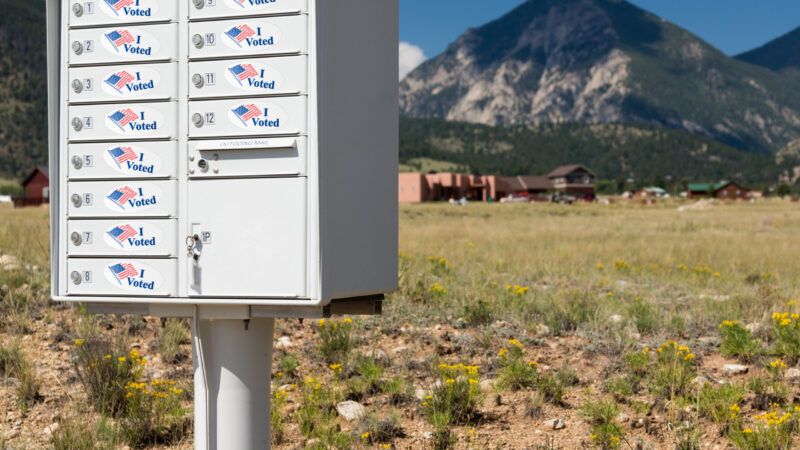Limiting Mail-in Voting Won't Make Elections More Secure
But it would continue the politicization of the means of voting and make it harder to vote.

The contentious 2020 presidential election is finally behind us, but debates about it will continue in state legislatures for a while as Republican lawmakers look to roll back expanded mail-in voting rules implemented before and during the pandemic.
Already, at least 165 bills have been introduced in 33 state legislatures to restrict voting access, according to the Brennan Center for Justice, a think tank housed at New York University Law School that advocates for democratic principles. About half of those would target mail-in voting, a widespread and established practice in America that nonetheless became a lightning rod for controversy during the past year as former President Donald Trump politicized it.
It's too soon to know whether there is adequate support for restricting mail-in voting in various states, but the bills already introduced will give lawmakers a wide range of options. One of the most common proposals, according to the Brennan Center's legislation tracker, would eliminate so-called "no-excuse voting," which allows anyone in the state to request an absentee ballot without having to provide a reason why they can't go to the polls. Other bills would restrict what excuses can be used to qualify for absentee ballots—removing concerns about getting sick from the list, for example—or would limit state officials' ability to send out absentee ballots without first getting a request for one.
If you want to understand how quickly attitudes toward mail-in voting have shifted, look no further than Pennsylvania. The state legislature passed a bipartisan bill in 2019 to expand mail-in voting, including a provision allowing no-excuse absentee balloting for the first time in the state's history. But after Trump and his supporters blamed mail-in voting for President Joe Biden's victory in the state—a claim easily disproved with some simple math—Republicans are now seeking to reverse that law.
The partisan inclination to change how elections operate after a single defeat—and keep in mind, lots of Republicans won in 2020 with expanded mail-in voting—is unfortunate, but not unexpected. Still, mail-in voting has been gradually expanding in America for years and that trend is likely to continue once the emotions triggered by the 2020 election fade.
Indeed, conservatives and Republicans would be wise not to restrict mail-in voting and should instead be focused on ensuring the process is secure. In a report published this week by the R Street Institute, a free market think tank, Steven Greenhut and Marc Hyden argue that reverting to excuse-only absentee balloting "would do nothing to combat fraud, and may instead suppress voter turnout."
Far from being a gateway to rampant fraud, when done correctly mail-in balloting is more secure than in-person voting. Even after an election in which 46 percent of votes were cast by mail—a huge increase that threatened to overwhelm election offices—there is nothing more than anecdotal evidence of problems with the process. In places where mail-in voting has been the norm for years, like Oregon, there is scant evidence of fraud.
Despite what critics claim, "no-excuse absentee voting still must undergo the same rigorous process to ensure ballots are legitimate, including ballot tracking measures and signature verification," write Hyden and Greenhut (a Reason columnist) in the new R Street study. "These safeguards are highly effective, too."
Leaving aside issues of voter fraud or election security, some Republican lawmakers might see a cynical reason to support attacks on mail-in voting since absentee ballots broke heavily toward Democrats last year.
But that's probably due to Trump's months-long campaign against mail-in voting rather than a systemic issue. Prior to last year, there was no indication that higher rates of mail-in voting advantaged one political party over the other. A 2020 Stanford University study that looked at absentee balloting since 1996 in California, Utah, and Washington concluded that "claims that vote by mail fundamentally advantages one party over the other appear overblown." And a Brennan Center analysis of voting patterns in seven swing states that offered no-excuse absentee balloting in 2016 found that the people most likely to vote by mail were white voters over the age of 65—a key Trump demographic.
And even amid his attacks on mail-in voting last year, Trump voted by mail in the Florida primary.
Rather than restricting a method of voting that is not inherently risky and that many Americans seem to prefer, lawmakers should prioritize election security with an eye toward the simple reality that mail-in voting isn't going to vanish and with an awareness that further politicizing the means of voting will be corrosive for the democratic system.
"Instead of seeking to ban tried-and-true methods of voting," Greenhut and Hyden write, "lawmakers should instead look to ensure that eligible voters have the utmost opportunity to safely exercise their voting rights."
